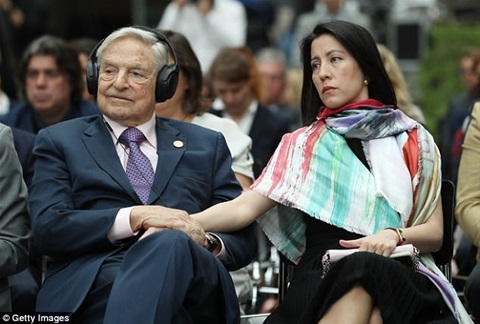George Soros [in brief]
What does he believe – What does he want – Is he a force for good?
What does he believe:
George Soros believes in money. He is financial market man. His first introduction after graduating from the London school of economics was in arbitrage* [using trading market price differences to margin a profit]
In a 60minutes interview in 1998 Soros stated that his character was formed at 14 by his experience of the NAZI’s during the occupation of Hungary. Soros saw that survival required detached ruthlessness. He helped round up Jews under the lie of being a Christian, [papers that his Jewish father had bought] via a Hungarian government official who then took George in as his godson. This merely goes to prove that George sees life as a sequence of events that need not be hidden. He is as fearless as his father was screwed, a trait he shares.
At the London school of economics Soros studied under Karl Popper. The general theory of *Reflexivity and ‘An ‘open society’ and its enemies’^.
[*Reflexivity is that market fluctuations are increased by discrepancies between the realities of market behavior and the beliefs, caused mainly by the politics of ignorance and the subsequent recoils within the market.]
This corresponds and plays in perfectly to Soros’s background from his formative financial days in arbitrage. He bets upon his keen and screwed learned, observed and proven skill sets, from his fine and equally proven character.
What does he want:
In the terms of Brexit George Soros’s reactions are twofold. 1. Instinctively [history] Soros benefitted from migration into a more open society. He was exposed to some extent to the restrictions of [the U.K] society after he left the London school of economics by the prejudice of the precious old boys club of banking [prior to deregulation by Margaret Thatcher] 2. He moved to New York [a much less regulated market society] where he continued in arbitrage. He formed his own investment company with a partner and double worked to build the fund and his personal stake. To George Soros an open market is everything, to him. He owes his Business and his very life opportunity to [the movement to] an ‘open society.’
A closed market is a place without democratic government or discussion or access to opportunity.
There is a vast distance between Soros’s ideal of an open society and a totalitarian state. Most importantly there is a huge middle ground or in fact, many types of possible middle grounds.
While George Soros has invested vast amounts of his money in developing more open societies in general [and certainly opening up societies to market opportunity] Soros is guilty of a number of contradictions and ironies that both reside in his dual histories of acquired ruthlessness and his feeling for the sanctuary of ‘an open society.’
Soros wants democratically elected leaders representing their electorates. But he decries referendums, citing that they get hijacked by bad arguments and usually give a poor result. Well that sounds like mainstream democracy to me. And that is ‘Reflexivity’, the very foundation of his business model.
‘’Open society is characterized by calm, rational discussion, free from the toxic, personal criticism we have seen in recent days.’’ – George Soros
The above quote does not sound anything like democracy as we know it, anywhere in the world that does any form of democracy. In fact it is totalitarian states that are free from rational, toxic and the personal discourse.
Is George Soros a force for good?
A moment of history: The book ‘An open society and its enemies’ has at its reference foundation the Greek philosophers. The question could be rephrased ‘Is the early Greek movements of the ideal society a good model for open society in the 21st century?’ [^Like many authors, academics, philosophers and for that matter people of ‘the human condition’, belief in ideals is subject to rigid thinking, to finding [or worse deciding] on solutions. The human condition [without strict early training] falls foul of the physics of the law of evolution. To have or to decide [as one gets older] a rigid conclusion [that may be forged on difficult ground or compromised in philosophy] is prone to becoming debilitated by the lack of adaptation in an environment constantly adapting. George Soros is becoming a Reflexivity factor within open societies Reflexivity to open society reflexivity.
George Soros see that his business model would benefit in ‘an open society’ with a larger margin performance, if market size were to increase by removing dividing barriers to reflexivity. A larger homogonous market, [just like a bigger pond would ‘ripple’] ‘relex’ more and bigger and more.
Final Irony:
‘’I came to distinguish between an open society – in which people elect their leaders, who are supposed to serve the interests of their electorate – and a closed society, in which rulers exploit the people under their control.’’ – George Soros
The Irony is that Europe is [Fell with open arms] into the hands of unelected commissioners unconnected [under legal control] of any elected heads of state under their directives. The market may have potential and free open movement might have a future but because of rushing, fiscal mistakes and thick gravy corruptions the reflexivity is massive and growing.
Furthermore peace in our time is being greatly threatened by rigid patriarchal imperialist attitudes of grandeur that they will not be able to match or the ambition of a damn burst to turn George’s world of reflexivity into a wash away.
The good news is that the reflexes are working to correct the problem and errors. The commission must die and the E.U must stop, at being a cooperative. Not another bounded, bounding empire, before it is too late.,
George Soros’s ideals are good but in today’s state, the E.U is a liability and people are not yet [far from] ready for a fully open society.
http://www.dailymail.co.uk/debate/article-5377025/GEORGE-SOROS-love-Britain-hate-Brexit.html
http://www.dailymail.co.uk/news/article-5377961/Migrant-ghettos-nuclear-bomb-future.html
